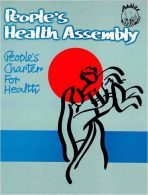
How to Join PHM
PHM is a popular movement working within the framework of the People’s Charter for Health – PCH. To get involved with the PHM, please endorse the People’s Charter for Health by submitting the form at the end of this page.
Let’s help PHM grow! To be involved in PHM’s activities in your country get in touch with your local PHM circle. To locate your PHM circle you can contact the regional co-ordinator for your region, the details of which you will find here. Organise a discussion within your organisation or write an article on the People’s Charter and encourage more people to sign!
How to be involved in the PHM
Subscribe to the Peoples’ Health Exchange!
The list serve called PHM-Exchange is the vehicle PHM uses to exchange experiences, share educational materials, organise campaigns, inspire solidarity action, coordinate our positions for international meetings and for lobbying and advocacy. The list is indispensable for our work as activists.
Make use of the PHM exchange to share your local PHM work, learning materials and PHM positions or statements via the exchange with the global movement! The exchange can also be used to encourage solidarity across the world for specific issues. All will be moderated for inclusion.
Click Here for more information or to subscribe to the PHM exchange
Explore the PHM Website
The PHM website is an interactive site, with space allocated for health activists to upload their work, actions, news and announcements. Each country can develop a webpage on the website or create a link to the local PHM websites.
Have a look at the PHM website. While browsing through you will find more information on what PHM is, the different programs, campaigns and resources on PHM related issues.
For possible addition on the website, send us a report, copy of invitation, programme, poster, photograph, video grab, press release, background papers, education materials or any other handouts about your PHM activity so that we can put it on the website and the PHM Exchange. Send these materials to globalsecretariat[at]phmovement.org. All will be moderated for inclusion.
Mobilisation and Action!
Advocating for the Right to Health, local campaigns, taking part in existing PHM programs and much more, all is rooted in your local grass roots and country level movement. The main area for activity of PHM is within countries. Your country may or may not have an active country circle. Contact your regional representative to find out who is already active in your country and what is happening in other countries in your region!
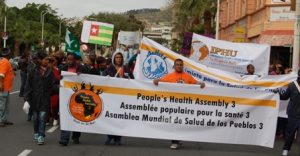
It is not necessary to set up a national structure before getting involved with the PHM. Often PHM is a loose network of organisations that wish to be united and carry out some actions as part of a social movement towards Health for All. When need be, they come together to work on specific activities, to draft a press release etc. In other countries, PHM is more structured; this is up to the country activists to decide.
Here are suggested ways for you to get involved in the PHM!
Country Circles
PHM circles are mainly set up by health activists and organisations to collaborate around specific issues locally that needs attention and civil society activity. There are different levels of engagement and collaboration between organisations and individuals part of PHM circles.
Drafting Press releases and sharing with PHM globally
For example PHM South Africa developed a press release condemning the police action directed at the Lonmin mine workers in South Africa. Groups across the world expressed solidarity with the statement.
Creating global or regional solidarity by developing statements in support of actions elsewhere.
For example the statements of solidarity to the Palestinian struggle.
Writing articles for journals on areas of concern specific to country issues or in reaction to violations.
For example, during PHA3, articles were developed by local PHM groups using PHA3 to highlight their local issues in national and international journals.
Contribute to the PHM Newsletter.
More engagement is required when PHM becomes the vehicle for organisations to organise themselves as a network around a specific issue, policy discussion or campaigns.
In India, PHM drives a large grass roots community campaign on the Right to Health, involving many civil society organisations raising awareness and offering examples on how to take action.
For example in South Africa, PHM is the umbrella under which several civil society organisations come together to campaign for a people centred National Health Insurance.
Being part of global PHM campaigns by linking local structures to feed into global solidarity.
For example the Global Campaign on Gender and Violence gains strength through being endorsed by local (existing and new) campaigns and as such becoming a platform of solidarity, exchange and information sharing. For more information on how to be involved in the PHM campaigns CLICK HERE.
WHO Watch is a PHM program providing expertise in WHO lobby activities. Locally, one can be part of WHO- Watch program through building country awareness and activity around national policy making and engagement with WHO. PHM people are available to assist and advise in how to be part of the WHO Watch. Contact us to find out if there are WHO watchers in your region!
Invite PHM people to come and speak at events, or create a seminar around PHM people visiting your country. PHM has build a large global network of health activists with specific expertise.
If an IPHU took place in your region and participants from your country attended, you could organise a series of information evenings where the material gets shared.
PHM developed the Health For All Campaign as its central campaign and to serve as an umbrella for more specific activism around priority social determinants of health, called Thematic Areas. In recent years, the Health For All Campaign has been used mainly as a platform for the thematic areas. Specific work within thematic areas is advanced through thematic circles, comprised of activists working in countries and regions as well as PHM’s global programmes. Currently PHM has six thematic circles. The respective thematic circle pages/links below review the thematic area, current work in the area, and long- and short-term goals. If you wish to volunteer/have any questions regarding the Health for all Campaign or any of the six thematic groups please contact deepika[at]phmovment[dot]org or the respective thematic coordinators.
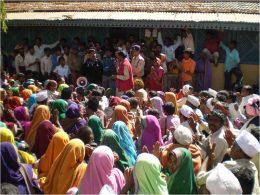
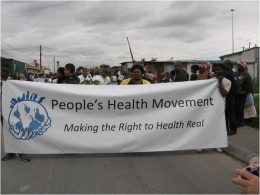
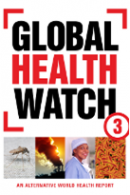
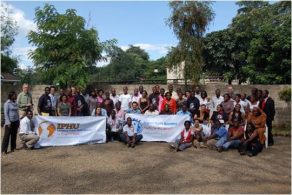
When local PHM health activism is strong, regional and global activities are a next step to be involved in the PHM, creating the links between different levels of action that can further strengthen local and national activities.
If your country doesn’t have a country circle, then set up a PHM circle or local chapter (guidelines to be developed). Circle development is guided by the local context and issues prevalent in that country, there is no set process or structure. Most circles are initiated around a joint campaign or issue of concern uniting them.
One way to start is to find out if there are other PHM activists, IPHU alumni or participants of past PHA in your country. You can contact your regional representative or the global secretariat for this. Following this, one can then organise a civil society meeting around a specific issue and on which actions will be developed. Linking up with the global Right to Health Campaign is a popular way to initiate country activity. The only requirement is that the circle operates within the framework of the PCH.
The structure of circles is fluid and can be adapted to respond to different issues. Rigid structures take the responsiveness away. Often it involves collaboration between different organisation and individuals who all want to set up collaborative action on a specific issue. These collaborations can change depending on the issue.
For example in India, many organisation are part of PHM, not all are involved with the same intensity at the same time. When a joint issue of concern arises, it depends of the issue and whether organisations are involved and/or feel called to be part of a group for action.
Regional actions
Sometimes, countries within a region all face similar problems or injustices for various reasons. Some injustices cannot only be dealt with at national level because regional bodies influence the policies and decisions within countries. Often regions face similar difficulties and sharing experiences and ideas can assist in developing regional action and sometimes positive change.
The following regions are represented in the Steering Council. Please find below the contact details of the regional representatives of your region to find out names of other activists in your country and activities taking place in your region.
Regional Representatives* | |||
Africa South & East | Peninah Khisa; Melanie Alperstein (alternate) | peninahkhisa [at] gmail.com; melani.alp [at] gmail.com | |
Africa West | Erick Kambale; Tonniè Fofana (alternate) | erick.kambale.eds [at] gmail.com; fofanatonnie [at] yahoo.fr | |
South Asia | Sharad Onta | sharadonta [at] gmail.com | |
East Asia Pacific | Paul Laris | laris.paul [at] gmail.com | |
Middle East | Zeina Mohanna | zeinamohanna [at] amel.org | |
Central America | Hugo Icu Peren; Morena Murillo | icuperen [at] yahoo.com; morena.murillo [at] gmail.com | |
Andean Region
| Luis Lazo Valdivia; Noly Fernández
| lucholazo80 [at] gmail.com ; nolyepiayuu [at] gmail.com carmenbaez5 [at] gmail.com ; martinmariluz [at] gmail.com | |
Brazil | Denis Saffer | desaffer[at] gmail.com | |
India | Amulya Nidhi | amulyab | |
Europe | Ana Vračar | ana [at] phmovement.org | |
North America | Jennifer Ware | egionalrep [at] phm-na.org | |
Programme Representatives | |||
Health for All | Sarojini N | sarojini_n [at] phmovement.org | |
Global Health Governance | Lauren Paremoer | lparemoer [at] gmail.com | |
IPHU | Hani Serag | haserag [at] utmb.edu | |
GHW | Chiara Bodini | chiara [at] phmovement.org / rlabonte [at] uottawa.ca | |
Network Representatives | |||
Alames |
| varelamolina [at] gmail.com; roselia.rosales [at] uacm.edu.mx | |
TWN | Yoke Ling | yokeling [at] twnetwork.org | |
Health Poverty Action | Jessica HamerMartin Drewry (alternate) | j.hamer [at] healthpovertyaction.orgm.drewry [at] healthpovertyaction.org | |
Ex officio | |||
Past Coordinator | Sundararaman T. | sundar [at] phmovement.org | |
Current coordinator
Network and Communications Coordinator | Román Vega
Miguel García | roman [at] phmovement.org
miguel [at] phmovement.org | |
Advisory Council | |||
Advisory Council | Alexis Benos | abenos [at] gmail.com | |
PHM intends to employ a Regional Outreach Coordinator in each key region.
Some of the roles of the regional outreach coordinator and regional structures, supported by the regional SC rep, would be:
- Supporting country circle development
- Supporting the local and regional Health for All Campaigns
- Supporting communication and collaboration between countries,
- according to regional needs, for example PHM Africa has a regional google group which is attached to a blog.
- The Middle East region has a listserv to encourage communications and information sharing.
- Supporting and encouraging networking in the region
- Strengthening representativeness and mutual accountability
- Assist in collecting resources for campaigns and of interest to the region

